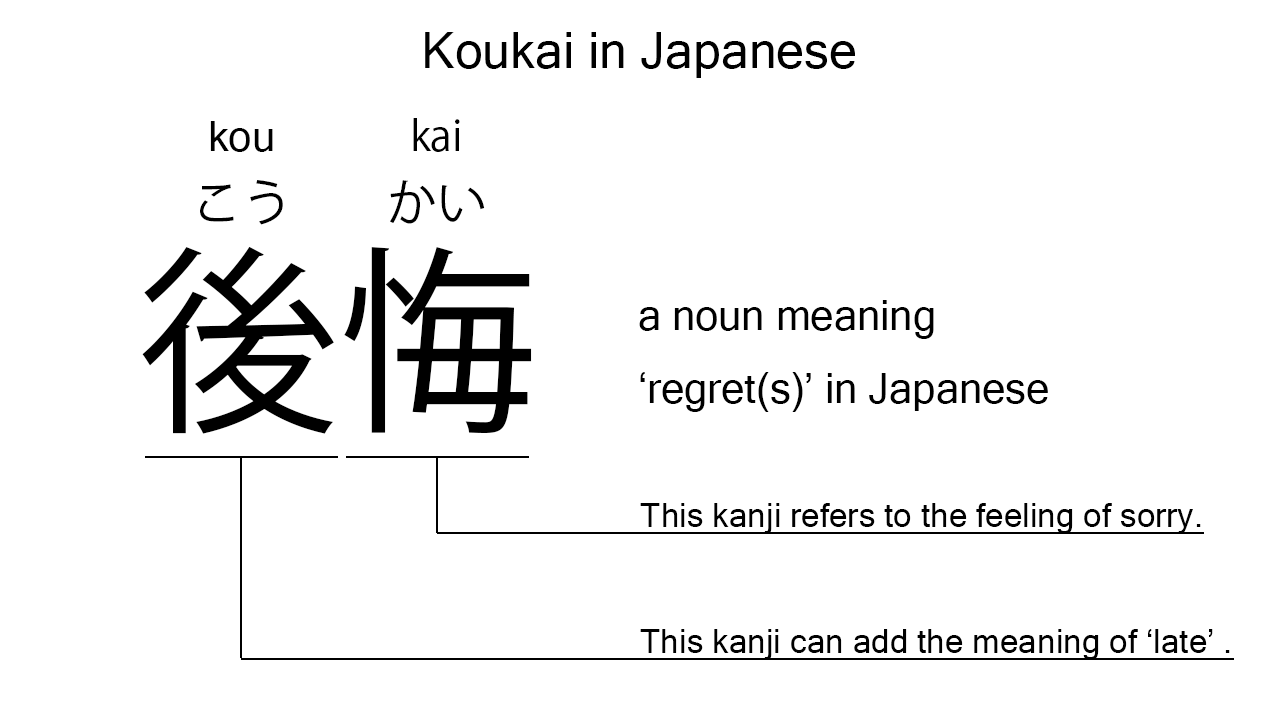What does “koukai” mean in Japanese?
There are some homophones in Japanese. When native speakers say “koukai” in conversations, however, it probably means ‘regret’ in Japanese. Perhaps, some Japanese learners know this word as it is sometimes used in Japanese movies, songs, novels, manga, anime, and the like. In this blog post, however, I will explain this word in detail based on its kanji expression. And also, I will explain how to use it through example sentences. My explanations would help Japanese learners understand “koukai” more clearly. Then, let’s get started!
Contents
Definition and meaning of “koukai”
Let me start with the definition and meaning of “koukai”.
- koukai – 後悔 (こうかい) : a noun meaning ‘regret’ in Japanese. This can also work as plural. Learn more about Japanese plural.
The definition and meaning are simple and clear. To understand this noun more clearly, however, let me explain its kanji characters in detail, one by one.
Koukai in kanji
The kanji expression of “koukai” consists of the following two kanji characters:
- 後 : a kanji character used to mean ‘after’, ‘later’, ‘late’, or such in Japanese.
- 悔 : a kanji character used to refer to the feeling of sorry or regret.
These two kanji characters tell us that “koukai” literally means ‘late to feel sorry’ in Japanese. This literal interpretation is not completely in line with the actual meaning, but still understandable, I think. When we have regret, we often feel sorry for something which we haven’t done properly.

When we meet new kanji expressions, we should check their kanji characters in detail to understand their meanings clearly and deeply. In many cases, kanji characters tell us a lot about the meanings of the expressions they form. Actually, here, we could get the better understanding of “koukai” through the detailed kanji check above.
So far, I’ve explained the definition and meaning of “koukai” together with its kanji characters. Then, let me explain how to use it through the example sentences below.
Example #1: how to say “regret” in Japanese
watashi wa koukai no nen wo kanjiru – 私は後悔の念を感じる (わたしはこうかいのねんをかんじる)
I have a feeling of regret.
Below are the new words used in the example sentence.
- watashi – 私 (わたし) : a pronoun meaning ‘I’ in Japanese.
- wa – は : a binding particle working as a case marker or topic marker. In the example, this works after “watashi” to make the subject in the sentence.
- no – の : a case particle joining two nouns. Normally, the first one can work as a modifier to describe the second. In the example, this works to join “koukai” and “nen”. The formed phrase literally means a ‘feeling of regret’ in Japanese. Word orders in Japanese and English are different, but the role of this case particle is similar to that of the English preposition, “of”.
- nen – 念 (ねん) : a noun meaning ‘feeling’, ‘thought’, or such in Japanese. This can also work as plural.
- wo – を : a case particle used to make the object word in a sentence. In the example, this is used after the noun phrase, “koukai no nen”, to make the object in the sentence.
- kanjiru – 感じる (かんじる) : a verb meaning ‘to feel’ or such in Japanese.
This is a typical usage of “koukai”. In this example, it works as a part of the noun phrase, “koukai no nen”, which means a ‘feeling of regret’ in Japanese.
Example #2: another usage of “koukai”
kore ga boku no koukai desu – これが僕の後悔です (これがぼくのこうかいです)
This is my regret.
Below are the new words used in the example sentence.
- kore – これ : a pronoun used to refer to something close to the speaker. In the example, this is used to mean ‘this’ in Japanese.
- ga – が : a case particle used to make the subject word or the object word in a sentence. In the example, this is used after “kore” to make the subject in the sentence.
- boku – 僕 (ぼく) : a pronoun meaning ‘I’ in Japanese.
- no – の : a case particle used after a noun or pronoun to make its possessive case. In the example, this is used after “boku” to make its possessive case, “boku no”, which means ‘my’ in Japanese.
- desu – です : an auxiliary verb used after a noun or adjective to make it polite. Probably, this is well known as a part of the Japanese desu form. In the example, this is used after “boku no koukai” to make it sound polite.
This is another typical usage of “koukai”. In this example, it works together with the possessive case, “boku no”, to mean ‘my regret’ in Japanese. When we want to mean ‘regret’ in Japanese, anyway, “koukai” is always a very good option.
Summary
In this blog post, I’ve explained the definition and meaning of “koukai” in detail based on its kanji expression. And also, I’ve explained how to use it through the example sentences. Let me summarize them as follows.
- koukai – 後悔 (こうかい) : a noun meaning ‘regret’ in Japanese. This can also work as plural. These two kanji characters literally mean ‘late to feel sorry’ in Japanese. This literal interpretation is not completely in line with the actual meaning, but still understandable, I think. When we have regret, we often feel sorry for something which we haven’t done properly.
Hope my explanations are understandable and helpful for Japanese learners.